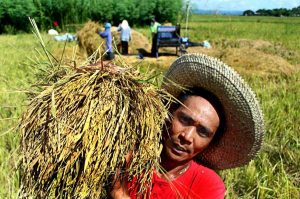
The Philippine Chamber of Agriculture and Food Inc. (PCAFI) called for the amendment of Rice Tariffication Law (RTL) to provide more flexibility in the use of the Rice Competitiveness Enhancement Fund (RCEF).
Danilo Fausto, PCAFI president, told reporters in a briefing in Quezon City last week the function of the National Food Authority (NFA) must also be revisited.
RCEF was created by the RTL which allocated all tariffs collected from rice imports to programs that would benefit local rice farmers. The law provides the fund will be collected only until June 2024.
RCEF’s annual P10 billion allocation is divided into mechanization program, P5 billion; distribution of high-yielding seeds, P3 billion; training and capacitating farmers ,P1 billion; and credit support, P1 billion.
PCAFI said if RCEF is extended, , the P5- billion allocation for mechanization can be used as incentives for local firms that will manufacture farm machineries.
“We need a local manufacturer of machinery, either (through) reverse engineering which means that you will import it then you will replicate it here,” Fausto said.
Fausto also urged the government to consider utilizing the NFA in stockpiling not only of grains but also of other basic commodities such as sugar, onion and fish.
“It must be a strategic stockpiling and not just for the sake of stockpiling… The NFA has the authority to inspect warehouses and cold storage facilities. It can see what goods are available so it can project what is lacking,” Fausto said.
He said NFA should be reauthorized to sell agricultural goods in market.
Under the RTL, the NFA can no longer sell subsidized rice in markets as its buffer stocks can be used only for emergency situations for disaster relief.
The law also allows the NFA to unload additional stocks only if these are aging or about to deteriorate. (Jed Macapagal, Malaya Business Insight)
